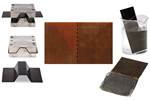Segula Technologies initiates Z-WasTEK project for composite recycling, repair
The combined use of 3R resin and the development of digital programs will target the repair and more responsible use of carbon fiber.
Segula Technologies (Nanterre, Ile-de-France, France) is developing technologies for producing sustainable carbon fiber composites through the Z-WasTEK project. Subsidized by the Spanish Ministry of Science and Innovation and the Basque government, Z-WasTEK seeks to address the difficulty of recycling and repairing composites by combining the use of a “3R” resin — which enables materials to be reprocessed, repaired and recycled — and the development of digital programs to define the best way of repairing parts.
For Segula, the project consists of two main points. First is the design of software for inspecting curved parts through the acquisition, management and interpretation of sensors. By performing a high-precision scan on curved parts, the software makes it possible to obtain information on points showing cracks and, after repair, to check whether the finish is correct.
Segula has also developed a 3R composite repair technology based on the creation of a digital twin. By capturing information about a part, the simulation (digital twin) makes it possible to define the best action for repairing it with 3R resin.
According to the company, by acting locally and specifically, the system developed can guarantee not only repair, but also the responsible use of materials and a reduction in the time and cost of materials.
The project’s main points of innovation are as follows:
- The development and optimization of a competitive and sustainable repair process for damaged composite parts.
- The development and optimization of a process for upgrading raw materials from production waste to recover both the 3R resin and the composite’s load-bearing capacity with the same initial quality at a competitive cost.
- The development of new high-performance, more durable and competitive 3R composites based on high-quality upgraded carbon fibers.
The project supports the circular economy and the use of low-impact, environmentally sustainable materials, and will cover a range of applications including in mobility sectors such as aeronautics, automotive and rail.
Related Content
-
Plant tour: Teijin Carbon America Inc., Greenwood, S.C., U.S.
In 2018, Teijin broke ground on a facility that is reportedly the largest capacity carbon fiber line currently in existence. The line has been fully functional for nearly two years and has plenty of room for expansion.
-
Sulapac introduces Sulapac Flow 1.7 to replace PLA, ABS and PP in FDM, FGF
Available as filament and granules for extrusion, new wood composite matches properties yet is compostable, eliminates microplastics and reduces carbon footprint.
-
Natural fiber composites: Growing to fit sustainability needs
Led by global and industry-wide sustainability goals, commercial interest in flax and hemp fiber-reinforced composites grows into higher-performance, higher-volume applications.

















